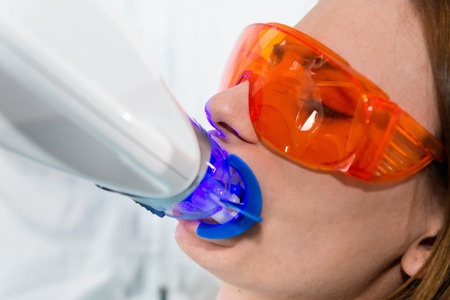Whenever you smile for a selfie with your friends, do you ever see less than pearly white teeth? If the answer is yes, then you have probably thought of teeth whitening. However, most people are put off by the numerous different prices, options, and the possible side effects. Many people get nervous about teeth whitening because of the many misconceptions that can lead them in the wrong direction.
Here are some of the myths associated with teeth whitening and the truth about them.
People with Sensitive Teeth Should Skip Teeth Whitening
They don’t have to, but they can consider custom bleaching trays at home, instead of going for power whitening at the dentist’s office. An individual with sensitive teeth should be wary about laser or in office bleaching. A custom tray is preferable as it gives desirable results in two weeks, and also allows you to have control in case of sensitivity. It is advisable to brush with toothpaste for sensitive teeth, at least two weeks before you commence on the whitening treatment to reduce sensitivity.
Teeth Whitening Causes Teeth Sensitivity
During the process, a few of the patients with a history of sensitive teeth may have temporary sensitivity. However, dentists offer gels during and after treatment to prevent sensitivity. In a few cases, there might be a little sensitivity, but it will vary from patient to patient. However, that lasts for only 24 to 48 hours. Nevertheless, the dentist will prescribe mouthwash or desensitizing gel for such patients to take care of the sensitivity. Patients should however, follow the dentist’s prescription to the letter to avoid any problems with their dental health in the future.
Teeth Whitening Is Permanent
As much as most people think teeth whitening is a permanent procedure, it’s not. The same way you need to repeatedly clean white clothes to keep them clean and striking, the same holds for the teeth. Almost every beverage and food will stain your teeth. Therefore, it is a lifelong commitment to continue keeping them white. It is highly recommended that you visit a professional dentist biannually and also practice habitual whitening maintenance. This is true especially for an avid drinker of colored beverages (tea, coffee or whine) and/ or a smoker.
Veneers and Crowns Can Be Whitened
The whitening gels that people use to whiten teeth only work on the natural teeth. They have no effect on any porcelain surface. Therefore, if you want the surfaces to match your teeth, you will have to replace your crowns.
Tooth Whitening Harms the Enamel
People have a misconception that teeth whitening works by laser zapping or melting off the enamel’s outer layer in a chemical reaction. This is not true. Bleaching works by letting the pores of the teeth open and allow a cleaning agent peroxide, to get inside the inner structure and clean any stains. With time, the pores close again.
Teeth Whitening Could Lead to Mouth Cancer
There is no scientific proof that the teeth whiteners are likely to cause cancer. However, it should be noted that the whitening effect will last for a shorter time in those who take a lot of coffee/ tea, smokers and betel nut (paan) chewers.
All Teeth Whitening Systems Are the Same
That is not true. There are whitening toothpastes, strips, trays, etc., and some of them use dissimilar concentrations of their respective active ingredient. Similar ingredients may be found in most of the systems found, but every product has its own bleaching composition that varies in degree and effectiveness. One has to know the products before purchasing.

